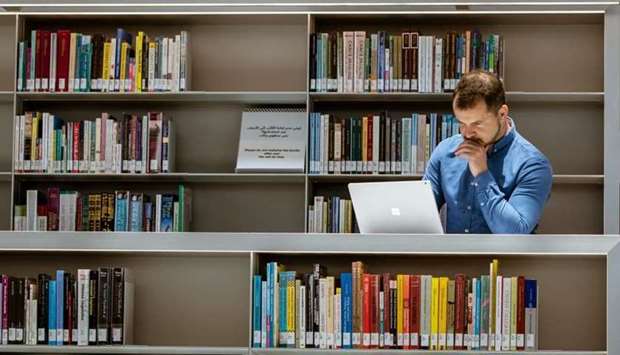A year has passed since countries around the world began issuing nationwide lockdowns to curb the spread of Covid-19 and a professor at Hamad Bin Khalifa University (HBKU) has reflected on the long-term consequences of the same, especially the social impacts of the pandemic.
“I think the pandemic has reminded us that we are social beings, and it involves a certain amount of physical interaction that simply cannot be replicated online. There is emerging evidence to suggest the long-term consequences may mirror those in natural disaster areas, such as post-traumatic stress disorder,” said Dr Marc Owen Jones, assistant professor of Middle East Studies and Digital Humanities at the College of Humanities and Social Sciences, HBKU.
Dr Jones feels that children have been particularly vulnerable due to school closures, with a worldwide increase in domestic violence reported, suggesting that the long-term fallout of Covid-19 could have far-ranging social impacts.
He also said misinformation about the pandemic has caused a number of problems from a public health perspective. “Conspiracies about the pandemic being fake have caused a burgeoning distrust in medical science and healthcare, and increased the likelihood that some may forego vaccination and social distancing measures. These will all delay the effectiveness of a response by increasing the transmission of the disease and holding back possible recovery,” he explained.
Dr Jones also noted that there have been different problems facing different regions regarding vaccination, from the problems the European Union had with trying to procure vaccines from AstraZeneca to disparities in the speed of vaccination across countries. “A trend has been public figures publicly taking the vaccine to increase confidence, something we have seen broadcast in many countries. Generally, most official coverage tends to promote the effectiveness of the vaccine, and conspiracies exist mostly on the Internet or fringe news channels,” he explained.
The academic also noted that the impacts of Covid-19 have been gendered across the Mena region, prolonging conflicts by re-shifting policymakers’ focus on health issues as opposed to internally displaced persons and refugees. “It will also disproportionately impact young women’s access to education, as families in already difficult situations compounded by the pandemic may be forced to choose who to send to school. Often, industries that predominantly employ women will be the hardest hit, such as entertainment and retail.”
“I think many of us have learned, despite the digital turn, that we still are social animals that crave interaction. We have learned to value our freedoms, even if that is the freedom to leave our homes. It’s also a reminder not to take the planet for granted, and how much privilege is embedded in the ability to travel or get on a plane. Fundamentally, I think it has given us a perspective on the fragility of the human condition, how we both need each other, and should not take our place on the planet for granted,” he added.
Dr Jones feels that children have been particularly vulnerable due to school closures, with a worldwide increase in domestic violence reported, suggesting that the long-term fallout of Covid-19 could have far-ranging social impacts.
He also said misinformation about the pandemic has caused a number of problems from a public health perspective. “Conspiracies about the pandemic being fake have caused a burgeoning distrust in medical science and healthcare, and increased the likelihood that some may forego vaccination and social distancing measures. These will all delay the effectiveness of a response by increasing the transmission of the disease and holding back possible recovery,” he explained.
Dr Jones also noted that there have been different problems facing different regions regarding vaccination, from the problems the European Union had with trying to procure vaccines from AstraZeneca to disparities in the speed of vaccination across countries. “A trend has been public figures publicly taking the vaccine to increase confidence, something we have seen broadcast in many countries. Generally, most official coverage tends to promote the effectiveness of the vaccine, and conspiracies exist mostly on the Internet or fringe news channels,” he explained.
The academic also noted that the impacts of Covid-19 have been gendered across the Mena region, prolonging conflicts by re-shifting policymakers’ focus on health issues as opposed to internally displaced persons and refugees. “It will also disproportionately impact young women’s access to education, as families in already difficult situations compounded by the pandemic may be forced to choose who to send to school. Often, industries that predominantly employ women will be the hardest hit, such as entertainment and retail.”
“I think many of us have learned, despite the digital turn, that we still are social animals that crave interaction. We have learned to value our freedoms, even if that is the freedom to leave our homes. It’s also a reminder not to take the planet for granted, and how much privilege is embedded in the ability to travel or get on a plane. Fundamentally, I think it has given us a perspective on the fragility of the human condition, how we both need each other, and should not take our place on the planet for granted,” he added.


